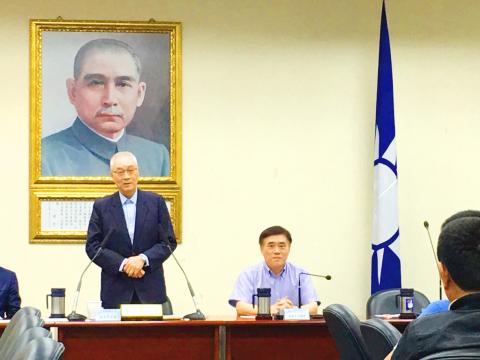Chinese Nationalist Party (KMT) Chairman Wu Den-yih (吳敦義) yesterday made it official: He has no intention of running for president.
As someone with more than four decades of experience in politics, if he wanted to make a run, he would have announced it on Nov. 24 last year after the party won mayoral and commissioner elections in 15 of the nation’s 22 cities and counties, he told the KMT Central Standing Committee at its weekly meeting.
“The reason I did not do that was because I have no such intention,” he said.

Photo: Lin Liang-sheng, Taipei Times
As chairman “his only goal” is to find a presidential candidate with “impeccable integrity, skills and experience and the greatest chance to win the election,” so that the KMT would regain power and bring the Republic of China (ROC) back to a bright path, he said.
He called for party solidarity and said that the KMT would aim to win at least 60 of the 113 seats in the Legislative Yuan.
KMT spokesman Ouyang Long (歐陽龍) said after the committee meeting that party officials would soon arrange for Wu to meet with potential candidates for next year’s presidential election: Kaohsiung Mayor Han Kuo-yu (韓國瑜), former New Taipei City mayor Eric Chu (朱立倫) and KMT Legislator Wang Jin-pyng (王金平).
Before the meeting, committee member Vincent Hsu (徐正文) and a dozen KMT members gathered outside the meeting room to urge the Central Standing Committee to bring forward the date of the party’s annual national congress to next month to discuss enlisting Han to run and nominate him without a primary.
A petition for such a move that he launched has won support from KMT members in 18 cities and counties, Hsu said.
The proposal represents “the voice of lower-ranked party members, KMT Central Committee members and Han’s supporters,” he said.
Central Standing Committee member Lee Chao-ping (李昭平) agreed to put forward the proposal during the meeting.
However, Ouyang told reporters after the meeting that the proposal had not been put forward for discussion because it contravened KMT regulations.
Party regulations state that members must be informed of the date and agenda of a national convention at least two months in advance, KMT deputy spokesman Hsiao Ching-yan (蕭敬嚴) said.
The next national congress is scheduled for July and cannot be moved forward any earlier than June, he said.
While regulations allow extraordinary national congresses to be held, the Central Committee must approve such a decision or it must be proposed by more than half of the party’s local chapters, he said.
“Whether that is necessary must be carefully considered,” Hsiao said, adding that the primary schedule has not been changed.
Applications for the primary would be accepted next month, with the primary scheduled for June and the nomination of the primary winner would be confirmed by the national congress the following month, he said.
The schedule could be adjusted if necessary, Ouyang said, adding that the Democratic Progressive Party has yet to decide on its candidate and there could be candidates from other parties.
Additional reporting by CNA

Chinese Nationalist Party (KMT) Chairman Eric Chu (朱立倫), spokeswoman Yang Chih-yu (楊智伃) and Legislator Hsieh Lung-chieh (謝龍介) would be summoned by police for questioning for leading an illegal assembly on Thursday evening last week, Minister of the Interior Liu Shyh-fang (劉世芳) said today. The three KMT officials led an assembly outside the Taipei City Prosecutors’ Office, a restricted area where public assembly is not allowed, protesting the questioning of several KMT staff and searches of KMT headquarters and offices in a recall petition forgery case. Chu, Yang and Hsieh are all suspected of contravening the Assembly and Parade Act (集會遊行法) by holding

PRAISE: Japanese visitor Takashi Kubota said the Taiwanese temple architecture images showcased in the AI Art Gallery were the most impressive displays he saw Taiwan does not have an official pavilion at the World Expo in Osaka, Japan, because of its diplomatic predicament, but the government-backed Tech World pavilion is drawing interest with its unique recreations of works by Taiwanese artists. The pavilion features an artificial intelligence (AI)-based art gallery showcasing works of famous Taiwanese artists from the Japanese colonial period using innovative technologies. Among its main simulated displays are Eastern gouache paintings by Chen Chin (陳進), Lin Yu-shan (林玉山) and Kuo Hsueh-hu (郭雪湖), who were the three young Taiwanese painters selected for the East Asian Painting exhibition in 1927. Gouache is a water-based

Taiwan would welcome the return of Honduras as a diplomatic ally if its next president decides to make such a move, Minister of Foreign Affairs Lin Chia-lung (林佳龍) said yesterday. “Of course, we would welcome Honduras if they want to restore diplomatic ties with Taiwan after their elections,” Lin said at a meeting of the legislature’s Foreign Affairs and National Defense Committee, when asked to comment on statements made by two of the three Honduran presidential candidates during the presidential campaign in the Central American country. Taiwan is paying close attention to the region as a whole in the wake of a

OFF-TARGET: More than 30,000 participants were expected to take part in the Games next month, but only 6,550 foreign and 19,400 Taiwanese athletes have registered Taipei city councilors yesterday blasted the organizers of next month’s World Masters Games over sudden timetable and venue changes, which they said have caused thousands of participants to back out of the international sporting event, among other organizational issues. They also cited visa delays and political interference by China as reasons many foreign athletes are requesting refunds for the event, to be held from May 17 to 30. Jointly organized by the Taipei and New Taipei City governments, the games have been rocked by numerous controversies since preparations began in 2020. Taipei City Councilor Lin Yen-feng (林延鳳) said yesterday that new measures by